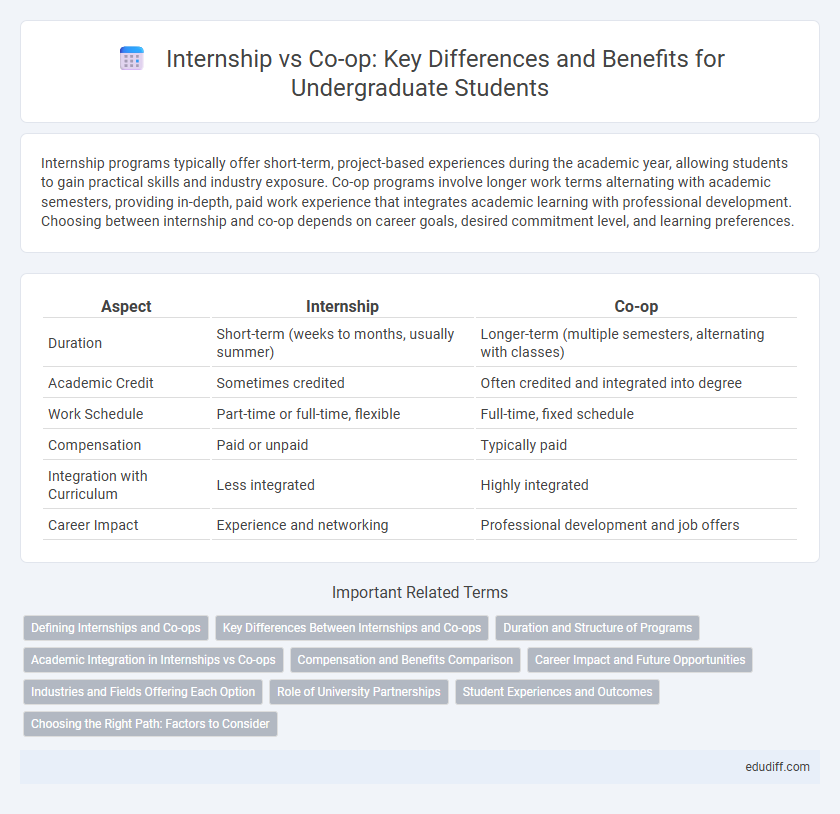Internship programs typically offer short-term, project-based experiences during the academic year, allowing students to gain practical skills and industry exposure. Co-op programs involve longer work terms alternating with academic semesters, providing in-depth, paid work experience that integrates academic learning with professional development. Choosing between internship and co-op depends on career goals, desired commitment level, and learning preferences.
Table of Comparison
| Aspect | Internship | Co-op |
|---|---|---|
| Duration | Short-term (weeks to months, usually summer) | Longer-term (multiple semesters, alternating with classes) |
| Academic Credit | Sometimes credited | Often credited and integrated into degree |
| Work Schedule | Part-time or full-time, flexible | Full-time, fixed schedule |
| Compensation | Paid or unpaid | Typically paid |
| Integration with Curriculum | Less integrated | Highly integrated |
| Career Impact | Experience and networking | Professional development and job offers |
Defining Internships and Co-ops
Internships are short-term, professional work experiences typically completed during the summer or a semester to provide hands-on learning relevant to a student's academic field. Co-op programs integrate multiple alternating periods of full-time work and study, often extending the undergraduate timeline but offering paid, in-depth practical experience. Both opportunities enhance employability by developing industry-specific skills and fostering professional networks within a student's chosen career path.
Key Differences Between Internships and Co-ops
Internships typically offer short-term, often summer-based work experiences that provide exposure to a professional environment without requiring long-term commitments, whereas co-op programs integrate paid, full-time work terms into the academic curriculum, extending over multiple semesters. Internships focus on skill acquisition and networking opportunities, while co-ops emphasize practical application of academic knowledge through structured work placements that contribute to course credit. Employers value co-op students for their deeper industry experience and continuous learning cycle between classroom theory and workplace practice.
Duration and Structure of Programs
Internship programs typically last from a few weeks to three months and offer short-term, project-based work experiences aligned with academic schedules. Co-op programs extend over multiple semesters, often six months or longer, integrating full-time paid work periods alternated with academic study. The structured alternation in co-op programs provides sustained industry exposure and deeper skill development compared to the condensed nature of internships.
Academic Integration in Internships vs Co-ops
Internships and co-op programs differ significantly in academic integration, with co-ops typically involving more structured collaboration between the employer and academic institution. Co-ops often include academic credit and require students to apply theoretical knowledge in a real-world context over extended periods, enhancing experiential learning. Internships, while valuable, tend to be shorter and less formally connected to the curriculum, offering broader exposure without the same depth of academic integration.
Compensation and Benefits Comparison
Internships typically offer limited or unpaid compensation, focusing on gaining practical experience, while co-op programs often provide paid positions with structured work terms integrated into the academic curriculum. Co-op students receive benefits such as competitive wages, possible health coverage, and professional development opportunities that align with their field of study. Compensation in co-ops tends to be higher and more consistent, reflecting the extended duration and work responsibilities compared to most internships.
Career Impact and Future Opportunities
Internships provide short-term work experiences that help undergraduates build professional skills and expand their network, enhancing their resumes for future job applications. Co-op programs offer extended, paid work placements integrated into academic curricula, granting deeper industry insights and often leading to higher job placement rates upon graduation. Both experiences significantly boost career readiness, but co-ops tend to result in stronger employer connections and more substantial career opportunities.
Industries and Fields Offering Each Option
Internships are widely available across industries such as marketing, finance, healthcare, and technology, providing short-term experiential learning opportunities. Co-op programs are predominantly offered in engineering, computer science, and applied sciences fields, emphasizing extended, paid work placements integrated into academic curricula. Both options allow students to gain industry-specific skills, but co-ops typically involve longer commitments and deeper professional development within sectors like manufacturing, software development, and engineering consulting.
Role of University Partnerships
University partnerships play a crucial role in facilitating both internships and co-op programs by connecting students with industry opportunities that enhance practical learning. These collaborations help align academic curricula with real-world skills, ensuring students gain relevant experience during their undergraduate studies. Strong university-industry relationships increase access to diverse placements, boosting career readiness and employability for students.
Student Experiences and Outcomes
Internship programs offer undergraduate students short-term work experience, often lasting a few months, providing exposure to industry-specific skills and professional environments. Co-op programs integrate multiple paid work terms within the academic curriculum, allowing students to gain extensive hands-on experience and build a robust professional network over a longer period. Research shows that students participating in co-op programs typically report higher job placement rates and greater career clarity upon graduation compared to those who complete only internships.
Choosing the Right Path: Factors to Consider
Choosing between an internship and a co-op involves evaluating the duration, academic credit, and work experience relevance to your undergraduate program. Internships typically offer short-term exposure, while co-ops provide extended, paid work integrated with academic semesters, enhancing professional development. Consider factors such as field alignment, employer reputation, and future career goals to determine the best path for hands-on learning and networking opportunities.
Internship vs Co-op Infographic

 edudiff.com
edudiff.com